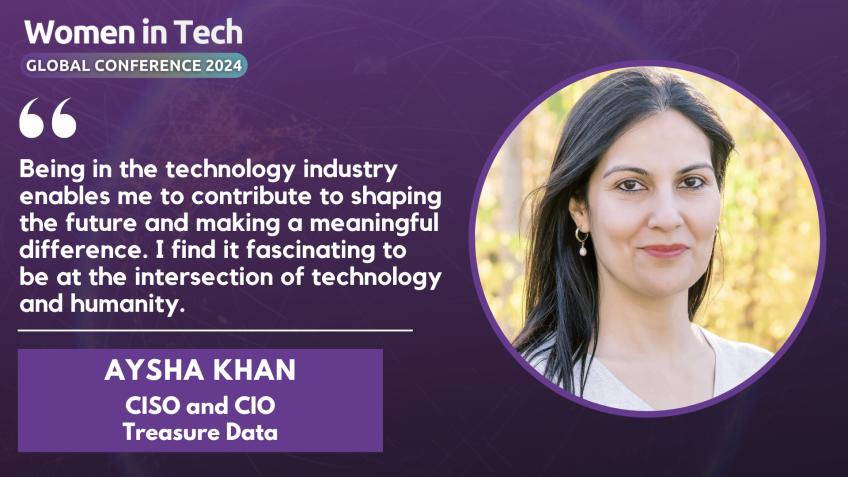Leading in Times of Change
Shikha Mittal
Senior Director, Product ManagementLeading Change in Uncertain Times
Change is never easy. It's a common refrain heard in every corner of our lives. Mark Twain once quipped that "the only person who likes change is a wet baby". Perhaps a touch hyperbolic, but it makes a point—change is uncomfortable. This has never been more apparent to me than in the past few tumultuous years. From the global shake-up caused by COVID-19, to dealing with the acquisition of VMWare, my ‘home base’ for the past 20 years. Understandably, this has caused turmoil both within the ranks of VMWare and in my personal life.
Acknowledging the Bumps in the Road
As a leader, it is exceptionally crucial to acknowledge the change around you and the discomfort it brings. Pretending it’s not happening will quickly erode the trust of your team. Admitting that you're uncomfortable, even vulnerable, is a huge step towards building trust.
The Value of Listening
Actively listening to your team's concerns and feedback during these uncertain times is essential. Whether it's a coffee chat or a more formal venting session, it's beneficial to hear what's on everyone's mind. This not only makes your team members feel heard and valued but also helps you gauge who might be more resistant or resilient to change.
Establishing a Shared Purpose
The importance of a shared purpose during times of change cannot be stressed enough. This common focus provides a 'lighthouse in the storm', anchoring all team members and giving them a unified direction. As circumstances change, the goal posts may shift—but having that shared purpose will always hold the team together.
Plan and then Plan to Deviate
During change, developing a plan—and a backup plan—is essential. It's a known fact that things are likely to change, but demonstrating to the team your adaptability and preparedness for these events is empowering and comforting.
Keep Communicating, Consistently
Consistent and repeated communication cannot be overstated, especially during periods of change. Regular updates and reminders keep the team aligned and in step with one another.
Below are some HTML lists to keep these fundamentals of change management always handy:
Quick Recap
- Acknowledge the Change
- Active Listening
- Share Purpose
- Devise a Plan
- Continuous Communication
Few Reminders
- Stay Positive
- Connect to the Bigger Picture
- Make Time for Learning
- Self-Care
Going through change can be a challenging experience. But equipped with the right knowledge and approach, it's certainly possible to navigate it. As leaders, it's our responsibility to guide our teams through these uncertain times with resilience while adopting strategies that maintain productivity - and sanity.
Let’s connect, discuss, and share our learnings—we're all in this together.
Video Transcription
Hi folks. Hi folks. Wish you all a very warm welcome to this session call leading in times of change. My name is Shika Mittal and I have been in the high tech space for over 20 years in the Silicon Valley here in California.And I am currently a senior director of product management at VM Ware where my team and I, we lead the delivery of digital workspace solutions uh in the cloud. I'm very excited to be talking about this particular topic because this really hits home. The last three years have been sort of a concentrated and accelerated learning modules of sods. And so while I'm no expert, um really, by any means, I did want to share my learnings based on my experiences and the experiences of my peers. So let's get started. So, Mark Twain many, many years ago said that the only person who likes change is a wet baby and maybe he was on to something because gosh, nobody likes change. And you know what? I don't even think the baby likes that change either. You know, and, and many of us have probably experienced that, but it is true that change is hard change is uncomfortable. Gosh. No. You know, in the past three years, I have definitely felt that as well. But good news is, it's not you because we are hardwired this way. Apparently, it, you know, to resist change is inherently a human nature.
And we can blame our evolutionary survival instinct that has sort of made it uh in this particular way because we are very cautious about change. So you should have some relief in knowing that this is not you personally, but really this is the wiring that we have. Um And so we just have to think about what this means and what, how we can overcome it. And I feel particularly like I mentioned earlier uh passionate about this topic because of that accelerated learning module that I found myself in like many of you in the past three years. So obviously, there was COVID-19 and um you know, with such a global team that I was responsible for, I needed to make sure that that uh COVID wasn't really disrupting our ability to perform, to be efficient, to stay really close, stay aligned. And while that was going on, as some of you may know, VM ware is in the middle of getting acquired. So that brought in a lot of uncertainty. And if you think um uncertainty lasts only for a little bit of time, my gosh, this is actually going on for a while now. And so I know that there, I have been fielding questions from my team.
There have been lots of questions even uh generally in the bigger organization just typical that happens in with any acquisition. So just when we were starting to get our handle on COVID-19, we had this and then, you know, there's technology as well. It is moving at a rapid space, a rapid pace. We've had a watershed moment with all things A I and ML with J GP T and LLM. So that's creating a lot of havoc as well. It's like, how can I stay on top of the trend? How can I make sure that my product, my solutions are as um cutting edge as it can be. So that's happening as well. And I got to tell you that also personally um within my family, it's there are changes happening there as well. I have a teenage son, he's going through his own motions and that is really the, the reality we come to work as our full person and there are all these changes happening. And that's why I say I feel like the last three years have been this concentrated learning module. And so I feel like I have some experiences based on my learnings. I just wanted to bottle that up and share with you and start a discussion with you and see what you are doing and what resonates with you. So that's sort of the background of why this topic and what to discuss.
So the first thing, what I've understood or what I have felt is that it's very important to understand the change. We shouldn't assume that all change is bad. In fact, there are, you know, a lot of things that sometimes happen for the better. So there's positive change, there is perhaps some uncertainty in the change, there are known changes and then there are unknown changes as well. I mean, you know, that there's changes coming, you just don't know what that might look like and how do you brace yourself for that?
And there could be the other piece which I'm also going through is there are changes in the organization and you as a leader are trying to make sure that you're shielding your team, you're owing your team and you're in it together. But then there are also changes that are happening maybe for you personally. What does that mean? And how do you bring your full self and how do you lead when things are maybe uncertain for you personally and not for the organization? So there is so much here that it is very important to take the time to pass through this so that you're able to handle it, you're able to uh acknowledge it and also then address it. So that's part of what I have been going through. And uh would want to definitely share that the first exercise is to just parse and understand the change and then in the, in keeping with codes. Guess what? Charles Darwin said? Right. It's not the strongest of the species, not most intelligent of the species. The ones that survive are the ones that are most adaptable to change. So, once you understand the change, it's all about adapting to that change, maybe it is good after all, maybe it is going to force you to get away with the old and, you know, bring in the new.
Uh maybe there is a silver lining in it or maybe there is no silver lining it and you just have to get on with it. We don't know, but just sitting still isn't going to help and we have to adapt to the change. And now the question is, how do you do that? And also how do you do that as a leader because you're not just talking for yourself, you're not batting only for yourself, you're batting for your team, you're batting for your organization. And that really is the crux of the challenge that we have in front of us. And I'm delighted to share with you what I believe are a few learnings that I've had now to ground myself. I like to remind myself what I am trying to do or what as a leader you are probably faced with as well. And I've just shared my perspective. There could be some differences here that you are having personally as well. But the net net is that ground yourself to say like, OK, I'm going to change. But what are the outcomes that I'm trying to achieve at the end of this, regardless of where or how tumulus the environment is around me. So for me personally, at least in my role, my goal is to make sure that I provide clarity in the ambiguous fog that is around us, whether the fog is because of the the change or even just uh if that is the nature of your business, like in my case with product management, usually the scenarios are that, you know, you're given a rather vague uh goal or an objective and it is really up to you to firm that up and find that um specifics and make a plan and, and carve out what that actually looks like.
So to provide clarity and ambiguity is one of my outcomes that I want to deliver. And I want to make sure that the change or whatever the process I'm going through does not affect that the second piece and it comes in really handy when you're going to change is to continue to the rally the people around you, your team and make sure that, you know, you are in this together.
Um Nobody should feel isolated. Um And they should feel that they are part of a larger entity because we are really stronger together. And then the third one is to ensure that we continue to deliver results in whatever those constrained circumstances might be or changed circumstances might be.
So I'd like to remind myself like that here are my three objectives or my three outcomes that I wanna make sure I have laser focus on regardless of what might be distracting me on a particular day or what might be distracting my team or all of us really together. So to combat this, I've sort of summarized five things which I have found are helpful for me and hopefully you find this helpful as well. So the first one is really to acknowledge the change and to acknowledge that discomfort that we are facing with whatever the change might have brought, because we've already established, that change usually means doing something which you're not used to. And I our survival instinct really kicks in and our hardwired mechanism is to say, I don't like it. And you might feel that, you know, maybe let's not even talk about it, let's just pretend it is not happening. But the fear and the, the risk with that is that you're going to lose the trust of your team very fast. And so even if you don't really have much to say in terms of what that change means, it's OK to say, you know, we are going through this, something has happened and boy, it is uncomfortable. I don't have all the answers.
And this is something which we went through, uh even through the acquisition that we are in right now, there has been a lot of uncertainty, especially in the beginning. It's a lot better now, but the idea is we don't know what's happening around us. And so the first thing really is to have that, um, vulnerability and to have that ability to say that, you know what? Yeah, I, I'm in it too. I, I don't know what's going on. There is some change, it is uncomfortable. Um, it builds trust now it is hard and I know this because it's hard for me or maybe even your team members to see you as a leader showing this vulnerability. Um Sometimes it is uh a bridge to cross for them and for yourself to show that but being authentic. Um and not pretending to know all the answers is a great way to build trust and it's ok. Um I think in the long run, even if your team may walk a, a feeling that, oh my God, my leader doesn't know what's going on, but that's ok because you're going to also do the other four things that I, I found very useful, uh which together then as a sum of all parts will build uh visibility and clarity um uh going forward.
So the second one is to actively listen to the um the opinions, the, the, the feedback from your team, maybe it's even a venting session. And what I found is that, you know, a happy hour um taking uh you know, getting the team together and say, let's just, let's just go out and, uh, you know, have lunch or have coffee or what have you just to hear just to hear what, what's on everybody's mind. I think that has been enormously useful and sometimes you don't even know what question you might be asking, but it's good to hear others asking and say, yeah, you know what I thought about that too. And you've articulated it so well, but being able to vent gives one, it gets it out of your system obviously. But the second thing is that the team feels empowered. Um I in a, in a sense that OK, I'm saying something I am being heard and then, you know, there's going to be something done about it because we have already been acknowledged as well. So I think as much as we may say that, oh, what's the big deal?
We do this all the time, being able to do this in a very concentrated, very intentional way, makes a world of a difference and also helps you as a leader to have a pulse of your system and also weed out those folks who might be a little bit more resistant to change and people who are resilient and are more adaptable to change.
You might also find ways to farm out your messaging because you know who has the emotional quotient to do this better. You can actually lean on them to spread that message. You start to figure out, especially when the going gets stuff who to lean on the third one. And I can't even stress this enough because this has really been helpful is to define reiterate and really underscore the shared purpose. Maybe I've already done this many times, but it does not hurt. And in fact, is critical that especially in the time of uncertainty or, or change that you are not able to put a finger on, you define that shared purpose because it helps the team to enhance the focus because you know what you're going to be looking at. And again, going back to that survival instinct. When there is a change, we are just hardwired to narrow our focus into what's ahead of us right now. And I just focus on that because again, that's that survival instinct. So if you're able to say that, OK, this is what we are trying to do. It helps the team to, to know that we are in it together, but then also have a, a joint sense of purpose. And sometimes it's hard, especially if you're going through an organizational change, maybe your charter has changed. That's gotta be tough. But even in that change, there are going to be certain things that you are responsible for. You are taking care of.
You are in that for a particular reason. And as a leader, it becomes your responsibility to really parse that out and bubble that up and make it, that shared focus. The next one is to make a plan and then to plan, to deviate because it's bound to change. So if you are able to present a plan and maybe one more and as this picture shows maybe a plan C as well, you're building resilience. This is not a sign of weakness and it's not a sign of showing that, ok, that, you know, you don't know what you're doing. You extremely well know what you're doing, but you're just prepared and you're also being resilient and there are different ways to or, or different aspects of it. It could be radically diff plan B could be radically different from plan A. But I think the Uber point that gets conveyed is that look even, I don't know what's happening, there's going to be some change that's coming. It could be the known change or an unknown change. But here's how we're going to get together and go through it because we have a few different tactics up our sleeves, we are ready and I think it's extremely empowering to know that, ok, I have something in my control that I can take care of and then of course, communicate, communicate, communicate.
Um It is um something which cannot be said enough, how to have consistency, how to have repeated communication. It drives alignment and you know how you may have heard how it takes about 7 to 8 times to repeat something in different mediums before that actually sticks. I think it's true. And especially when you are going through some kind of a change, you're not even focusing when it's said to you directly being able to say that over and over again, I think has a lot of value. So this allows you to drive alignment and then I wanted to quickly also add some reminders. So yeah, you know, you have that five points that are good things to keep in mind to say, ok, if I did did this, I'm most likely be able to navigate. But here are some reminders as well for you as a person because gosh, I had to remind myself repeatedly on this one is that you gotta be positive for your team for your organization and sometimes it's really hard, um maybe you have to fake it to make it, you know, or fake it till you make it, but you have to stay positive because there are positives even in change, there are positives that you can rely on your team.
For instance, gives is probably a big source of that. The other piece is to connect to the bigger picture again. Going back to that, uh you know, that hardwired sense to really focus on what is immediately in front of you during change. Well, you have to force yourself out of it and look past that horizon because that's what you can share with your, with your uh team or, or your organization to say here is the bigger picture. Here's how we connect to it. Here's what is the role we're gonna play. And that might even transcend that change, being able to do. That is something that will make you a true leader and it might require some forcing. But if you can force yourself to do it, that is a cool uh way to lead through change. And also this is a great time to learn, you know, not only you yourself, but with your team, I like to share books uh with my team to say, look, this is what I'm planning to read. It's not even a book that I might have read. In fact, it's, it's a way to set a goal for us together and we are able to do that and grow together and then finally taking care of yourself if you can't take care of yourself, um Ask your spouse to help you, ask your friends to help you.
Uh because guess what if you don't take care of yourself, you're not able to stay positive or do any of the other things. So, yeah, these were a few reminders that I have sort of kept for myself over the past few years that I have uh gone through. And I'm delighted to share this with you. I have to know if there are any questions, what are you doing on your end? Anything which, which resonates with you. Uh please let me know if not here in the Q and A. Um, it'll be great if you can connect with me and I would love to uh chat with you offline as well. So, thank you so much.






